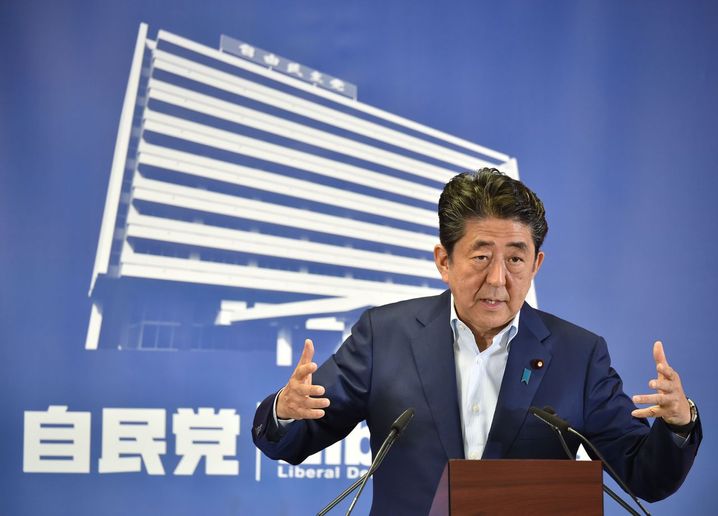 |
|
Japanese Prime Minister Shinzo Abe during a press conference on the results of the House of Councillors election at his party headquarters in Tokyo on July 22. (Yonhap News)
|
Liberal Democratic Party fails to secure enough seats to amend constitution
The “semi-victory” in the Japanese House of Councillors’ Upper House election by Prime Minister Shinzo Abe’s coalition party – which failed to secure the number of seats needed to push through an amendment of the country’s constitution – is subtly emerging as a variable in Tokyo’s frictions with Seoul. To begin with, the Japanese government’s pressure tactics against South Korea are predicted to continue, with South Korea’s white list removal expected to proceed following a public comment period through July 24. This has to do with the retaliatory export control measures spearheaded by Abe against South Korea being not simply a House of Councillors election issue, but a multi-purpose strategy to “bring Seoul in line” and revamp the Northeast Asian security and economic structure. In a press conference on July 22, Abe declared, “When I think of Japan-South Korea relations at the moment, the biggest question is whether or not they keep promises between countries.” He also repeatedly emphasized that South Korea had “failed to honor the international treaty that served as a foundation for normalizing diplomatic relations with its unilateral violation of the South Korea-Japan Claims Settlement Agreement.” “Speaking of the export management [measures], this was a reexamination of operations from the standpoint of suitable implementation for security purposes under international rules. It is not a ‘counter measure,’” he said, reiterating his previous stance on the issue. A South Korean government official said, “While there may be some margin for Japan to change its stance now that the House of Councillors election is over, we need to prepare with the expectation that the measures it has previously announced will go ahead.” But with the popular sentiments expressed in the House of Councillor election results suggesting an unfavorable environment for Abe to push forward with even harsher retaliatory measures against Seoul, some analysts are suggesting the possibility for a diplomatic resolution. Commenting on the significance of the election results, Nam Ki-jeong, a professor at Seoul National University, noted, “Japanese voters offered a vote of confidence when they gave Abe and his coalition party a majority of seats, but they opted to keep amendment of the constitution in check when they failed to give them the two-thirds of seats they would need to do that.” “Sole candidates on the opposition side also won in regions that are tied to major issues in Japanese society – including nuclear power, US military bases, and Aegis Ashore [a land-based missile interception system] – which sent Abe the message that he needs to be cautious with his handling of the situation,” Nam noted. Under the circumstances, analysts said that while Tokyo may carry on with its pressure tactics and South Korea’s removal from Japan’s white list, it is unlikely now to ratchet up the level of its retaliatory measures too far. “Even in Japan, you had the opposition and businesses arguing that the grounds for the export control measures against South Korea were feeble, and with predictions of a backlash if South Korea is removed from the white list, there could be a signal from Tokyo to Seoul that it wants to resolve things diplomatically,” Nam suggested. “We need to pursue an international opinion campaign by speaking fair and square to the WTO and elsewhere about Japan’s mistakes, while developing new ideas in terms of a solution on the forced labor issue and acting in a way that takes the Japanese businesses and public opinion into account,” he advised. Abe expected to pause attack to gauge response from Seoul at some point Lee Won-deog, a professor at Kookmin University, predicted, “The Japanese government will gain the discretionary power to remove South Korea from the white list and beef up reviews on exports to South Korea, but he won’t actually have the opportunity to wield the stronger export review weapon before forced labor survivors have Japanese companies’ assets liquidated.” “Abe’s offensive against South Korea will continue for the time being, but at some point he will pause to observe the response from Seoul, and there’s now the possibility for things to be resolved diplomatically if Seoul can come out with a reasonable solution on the forced labor issue,” he suggested. The South Korean government appears poised to continue calling on Tokyo to agree to diplomatic negotiations while at the same time working on winning international support for its position, including submitting an opinion to the World Trade Organization (WTO) on July 23 regarding the unfairness of Japan’s export measures and removal of South Korea from its white list. Prime Minister Lee Nak-yeon left the door for negotiation with Tokyo open last week when he said the proposal for South Korean and Japanese businesses to jointly create a fund for forced conscription survivors was “not our administration’s final plan.” By Park Min-hee, staff reporter, and Cho Ki-weon, Tokyo correspondent Please direct comments or questions to [english@hani.co.kr]






